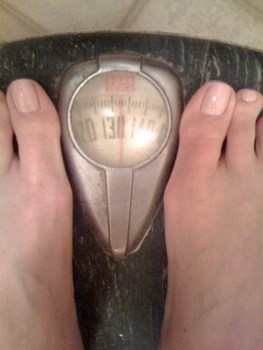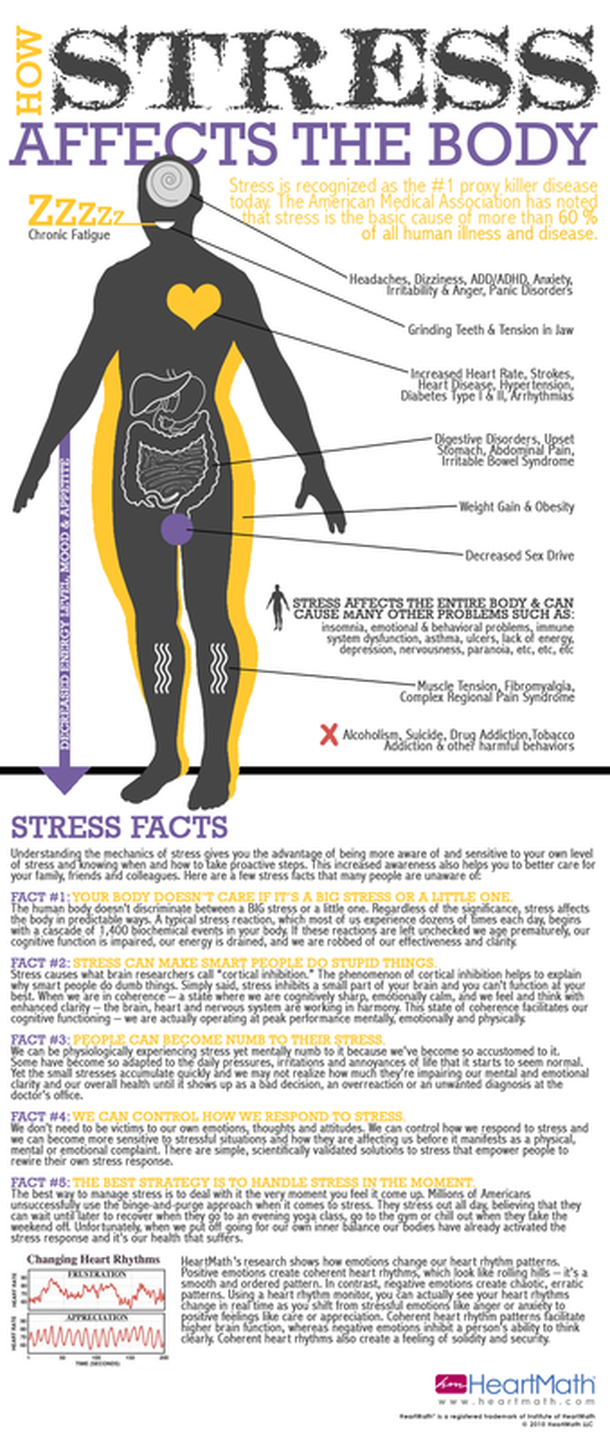|
Know what I love about HeartMath? Everything. Ok, so that's not very helpful. Let me explain. HeartMath really addresses the root of my patients' stress-related issues. I feel that this particular type of biofeedback, which uses guided intervention in heart rate variability patterning, gets to the bottom of issues which are so prevalent in our society (feeling stressed out, exhausted, nervous wrecks, overwhelmed, constant fatigue, the list goes on and on). So here's the whirl-wind intro, though you're always welcome to call for a complimentary 15 minute introductory consult... you can meet me and talk further about how I can help you achieve a better state of health. First, why would someone use HeartMath? Well, one of the most common reasons is a stress-related condition, such as anxiety, depression, insomnia, hypertension, attention disorders and chronic pain. Take a look at the many ways stress ruins your body and mind If the image above is a little blurry, here's the original
Bad, huh? Yes, in general, stress is bad. A little is ok, but most of us have waaaay more than a little stress in our lives. So how does HeartMath work? What is it doing? It's harnessing your innate heart-brain connection, and using that internal power for good (relaxation and restoration) instead of evil (panic attacks and out of control emotions). Trippy, huh? It is optimizing the communication between your nervous, cognitive hormone and immune systems to balance out any mis-signaling. Through this process you will learn to identify and remove all internal signals that, perhaps subconsciously, are working against you instead of for you. The end result? Common effects are increased happiness, more positive outlook on life, little or no stress reaction from what was before stress-inducing issues (work, relationships, finances), a full release from prior feelings of overwhelm and burnout and the ability to finally overcome a physical or hormonal issue (like those listed in the graphic above) just to name a few. This technique is simple, powerful, and transformative. Everyone should give it a try. How does this whole process work? You can learn from the decades of research and look up conditions and information important to you on the HeartMath website. They offer biofeedback devices to anyone, though working with a healthcare professional such as myself ensures proper monitoring, assistance and its optimal placement within a comprehensive wellness approach. I use HeartMath biofeedback during office visits and program check-ins for those who could benefit from its use as well as offer shorter stand-alone sessions. To best learn and implement the biofeedback techniques in your everyday life above and beyond the few times I guide you through the process. Most patients benefit from an initial round of 4-6 sessions which will be part of an all-inclusive integrative plan where all your healthcare issues are addressed and attended to. My current weight loss and stress reduction program, 'slim down & happy up,' includes HeartMath sessions during as many of the bi-monthly check-ins as you'd like. That means up to 6 HeartMath sessions are automatically included in the program, no extra cost at all! The next 'slim down & happy up' program will run 3 months, starting September 9th. Registration begins on our next session Monday, August 19th, check out the full details here. To your good health,
0 Comments
 So back in my "Nutrition 101" days of my Naturopathic medical education, I learned the commonly taught old school nutrition idea of: "weight loss = more calories burnt than consumed" So that's it, huh? Eat less calories, burn more calories and weight loss will be a sure thing? Well, most of us know it's just not that easy. In fact, many find that they gain weight during and after dieting, even if they increase their activity level. So what's going on?! The fact of the matter is, only 1 in 6 dieters keeping the weight off (after a year). So why can't we all just follow that easy formula and lose those extra pounds?! ...because it just isn't so simple. We are a little more complex than calorie consuming and burning machines (but you probably knew that already). An article published last week in the Journal of the American Medical Association provides a little insight into some of those dieting and weight loss complexities. The publishing authors looked at overweight research participant using three different diet and weight loss programs and measured their success. The three diets were low-fat, low glycemic and low carbohydrate (high protein). Under carefully monitored in-patient hospital settings, the low glycemic dieters burned an average of 200 calories per day more than the low fat. The low carbohydrate dieters lost 300 calories more per day than the low fat dieters but saw an increase in blood levels of inflammatory markers (cortisol and CRP). So what does this all mean?! Just follow the diet where people burned the most calories while being constantly monitored in the hospital? Well, that doesn't sound like a very enjoyable diet program to me. If you're considering a weight loss-focused diet and exercise program, think about getting an expert involved to guide your path to success. If you haven't heard by now, my past 'slim down & happy up' program sessions have provided women (& men) with guided, individualized meal planning, diet guidelines and exercise recommendations. Combined with unique natural formulas that I craft specifically to each participant, this really is my all-in-one tool to address weight loss and stress reduction for long-term success. Registration for our next session opens Monday, August 19th, full details here. Join us for 3 months, and just see what a profound impact you and I can have on your health and quality of life! |
Archives
June 2024
Categories
All
|
about the doc |
patient infocontact |
|
Privacy Policy
© Copyright 2011-2024, Dr. Angela Cortal ND LLC website content is for educational purposes only and is no substitute for medical advice (see the Terms of Use Agreement for this site), you must establish a doctor-patient relationship to receive that! |



